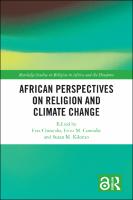African Perspectives on Religion and Climate Change
Proposal review
| dc.contributor.editor | Chitando, Ezra | |
| dc.contributor.editor | Conradie, Ernst M. | |
| dc.contributor.editor | Kilonzo, Susan M. | |
| dc.date.accessioned | 2022-05-09T10:24:28Z | |
| dc.date.available | 2022-05-09T10:24:28Z | |
| dc.date.issued | 2022 | |
| dc.identifier | ONIX_20220509_9781000587586_7 | |
| dc.identifier | ONIX_20220509_9781000587586_7 | |
| dc.identifier | OCN: 1303569873 | |
| dc.identifier.uri | https://library.oapen.org/handle/20.500.12657/54326 | |
| dc.description.abstract | This book interrogates the contributions that religious traditions have made to climate change discussions within Africa, whether positive or negative. Drawing on a range of African contexts and religious traditions, the book provides concrete suggestions on how individuals and communities of faith must act in order to address the challenge of climate change. Despite the fact that Africa has contributed relatively little to historic carbon emissions, the continent will be affected disproportionally by the increasing impact of anthropogenic climate change. Contributors to this book provide a range of rich case studies to investigate how religious traditions, such as Christianity, Hinduism, Islam, and indigenous faiths influence the worldviews and actions of their adherents. The chapters also interrogate how the moral authority and leadership provided by religion can be used to respond and adapt to the challenges posed by climate change. Topics covered include risk reduction and resilience, youth movements, indigenous knowledge systems, environmental degradation, gender perspectives, ecological theories, and climate change financing. This book will be of interest to scholars in diverse fields, including religious studies, sociology, political science, climate change, and environmental humanities. It may also benefit practitioners involved in solving community challenges related to climate change. This book interrogates the contributions that religious traditions have made to climate change discussions within Africa, whether positive or negative. Drawing on a range of African contexts and religious traditions, the book provides concrete suggestions on how individuals and communities of faith must act in order to address the challenge of climate change. Despite the fact that Africa has contributed relatively little to historic carbon emissions, the continent will be affected disproportionally by the increasing impact of anthropogenic climate change. Contributors to this book provide a range of rich case studies to investigate how religious traditions such as Christianity, Hinduism, Islam, and indigenous faiths influence the worldviews and actions of their adherents. The chapters also interrogate how the moral authority and leadership provided by religion can be used to respond and adapt to the challenges posed by climate change. Topics covered include risk reduction and resilience, youth movements, indigenous knowledge systems, environmental degradation, gender perspectives, ecological theories, and climate change financing. This book will be of interest to scholars in diverse fields, including religious studies, sociology, political science, climate change and environmental humanities. It may also benefit practitioners involved in solving community challenges related to climate change. | |
| dc.language | English | |
| dc.relation.ispartofseries | Routledge Studies on Religion in Africa and the Diaspora | |
| dc.subject.other | christianity | |
| dc.subject.other | environment | |
| dc.subject.other | indigenous religion | |
| dc.subject.other | islam | |
| dc.subject.other | religious authority | |
| dc.title | African Perspectives on Religion and Climate Change | |
| dc.type | book | |
| oapen.identifier.doi | 10.4324/9781003147909 | |
| oapen.relation.isPublishedBy | 7b3c7b10-5b1e-40b3-860e-c6dd5197f0bb | |
| oapen.relation.isFundedBy | Knowledge Unlatched | |
| oapen.relation.isbn | 9780367707712 | |
| oapen.relation.isbn | 9780367616076 | |
| oapen.relation.isbn | 9781003147909 | |
| oapen.collection | Knowledge Unlatched (KU) | |
| oapen.imprint | Routledge | |
| oapen.pages | 254 | |
| peerreview.anonymity | Single-anonymised | |
| peerreview.id | bc80075c-96cc-4740-a9f3-a234bc2598f1 | |
| peerreview.open.review | No | |
| peerreview.publish.responsibility | Publisher | |
| peerreview.review.stage | Pre-publication | |
| peerreview.review.type | Proposal | |
| peerreview.reviewer.type | Internal editor | |
| peerreview.reviewer.type | External peer reviewer | |
| peerreview.title | Proposal review | |
| oapen.review.comments | Taylor & Francis open access titles are reviewed as a minimum at proposal stage by at least two external peer reviewers and an internal editor (additional reviews may be sought and additional content reviewed as required). |

